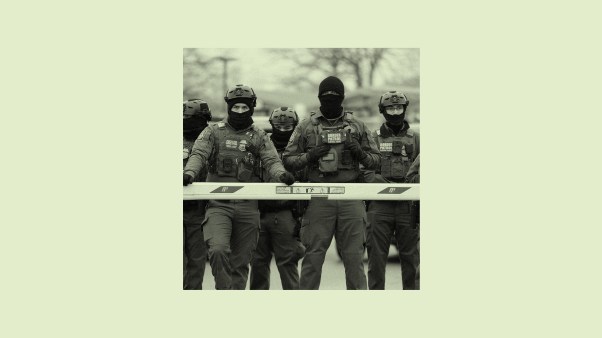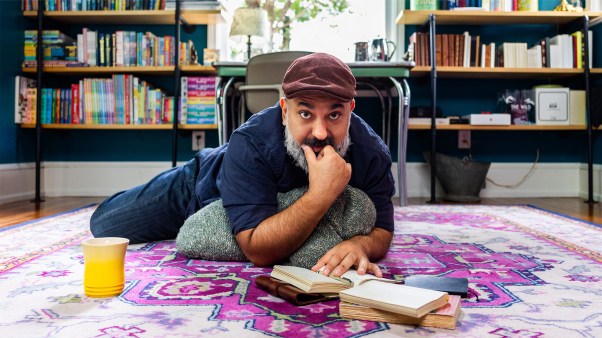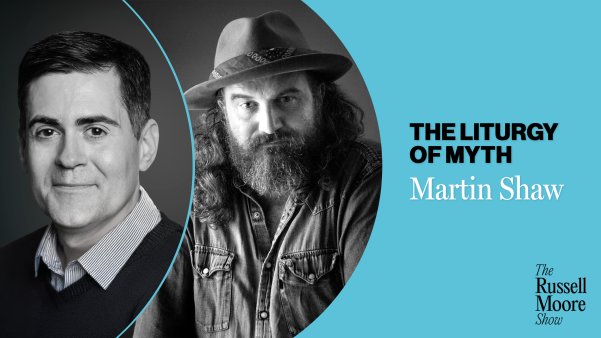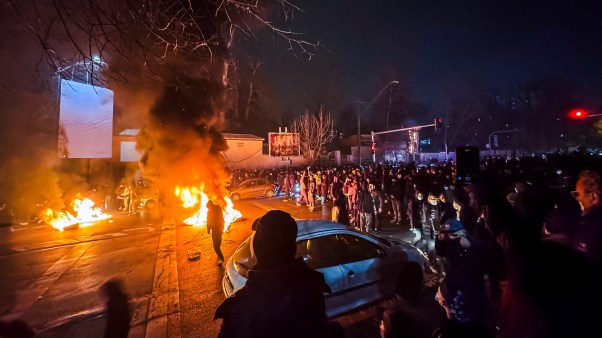The semi bounced along moonlit ruts in the backcountry of the Texas Panhandle as my hand danced among the gears. My mind, as it does most nights, replayed the downward spiral of my once-happy life. I had gone from lecturing in a seminary classroom to hauling wastewater through the oil fields. From polished dress shoes to steel-toed boots. From living my dreams to a life unraveled—one I had chosen, one I now regretted.
There I sat, a son raised in the Father’s house, who had foolishly followed the trail blazed by the prodigal into a far-off country, to live—or rather, merely to exist—in a self-imposed exile from the church. The stench of diesel and failure followed me.
“Midway in our life’s journey, I went astray from the straight road and woke to find myself alone in a dark wood.” I could have tattooed these opening words from Dante’s Inferno across my chest. But unlike Dante, I had no Virgil to guide me, no Beatrice awaiting me. Just the shades of shame and the ghosts of guilt to dog my steps as I stumbled forward.
What I didn’t see then—what I see now—was the Father’s unseen hand zigging and zagging me forward in a slow but steady path, stubbornly pulling me toward hope.
How I went astray is as boringly unoriginal as sin always is. Evil mimics good with a grim twist. I didn’t fall; I dove—I had willfully chosen to eat forbidden fruit, plucked from the tree of infidelity. I bulldozed my little Eden of an intact marriage and family, ideal teaching job, rising career, close circle of students and colleagues, and my place in the church.
There I sat, bitter and broken, hauling waste by day and self-loathing by night.
Even now, 20 years later, I remember the predictable pattern of my weeks. Mondays would find me angry at God and bitter at the world. On Wednesdays, I was choking on disgrace and guilt. Fridays I would pray through whiskeyed breath for mercy—that the Lord would make me right with him and then divinely end my dismal life. Every Sunday was the same: a day I wouldn’t dare show up to church. I imagined every eye judging me. I wasn’t sure if God was for me, against me, or, worse—indifferent.
We who stray from the church all have our stories. This is mine.
It’s a painful story, but not an unfamiliar one. My parents lived it. Maybe you’re living it. More likely, there are parents in your congregation living it.
As a pastor, I don’t need to tell you how common this story is among the parents in your pews. You’ve sat with parents whose hearts are heavy with silence from their sons. You’ve prayed with mothers who carry the weight of spiritual longing for their daughters. You’ve watched in confusion as grandparents grieve their beloved grandson or granddaughter who has walked away from the community of believers. You’ve heard the questions behind the tears: Where did we go wrong? Did we push too hard—or not enough? What could we have done differently? What can we do now?
Some of those questions come laced with guilt. Others drip with helplessness. But behind them all is a parent who once rocked a child to sleep, prayed over their baptism, and imagined a future where they’d worship side-by-side in the same pew. That dream feels impossibly far now. And as their pastor, you’re called not to resolve that ache but to faithfully walk with them through it.
Parents who wrestle with these questions and heartaches are not a shrinking minority. Quite the opposite. As Jim Davis, Michael Graham, and Ryan P. Burge make clear in The Great Dechurching, we are in the midst of a broad and unprecedented exodus of people from the church. We are talking 40 million people broad. They call it the “largest and fastest religious shift in US history.” But for parents, that number isn’t a statistic. It’s the face of their son or daughter.
I dechurched before “dechurching” entered our vocabulary. My reasons were numerous and emotionally complex. But topping the list was disillusionment with church leadership. I remember a denominational leader sending an email to “warn” regional pastors that I was living in their area, as if my attending a service, seeking help and forgiveness, was somehow a threat.
My experience, echoed by many dechurching today, is this: The church too often looks less like a place that welcomes sinful failures into a community of grace, and far more like a tribunal ranking where some sins are deemed “worse” than their own. As if the Bible read, “For all have sinned…but you more than me.”
You have likely heard similar frustrations from the parents in your congregation. Some of their children no longer believe. Some still believe but don’t attend church. Others are cautious, wounded, and reluctant to re-engage in congregational life again. Their reasons range from the church cozying up with political tribes to disillusionment over issues like the church’s teaching on sexuality. No single narrative fits all.
And yet, this isn’t a matter of one side bearing all the blame. Can parents shoulder part of the blame? Yes, especially if they modeled a legalistic, gospel-less approach to the faith that portrayed Jesus more as a taskmasker than a Savior, as if he said “Come to me, all you who are weary and heavy laden, and I will shoulder you with more to do.” Can pastors be to blame? Yes, if they chose to speak the truth but not in love, or to love but not speak the truth—creating either a compassionless Christianity or a superficial spirituality.
Can the dechurching children be to blame? Of course, whatever their reason or excuse, understandable or not, there is never a justifiable cause for turning one’s back on Christ and his church. When Paul wrote to that scandal-ridden church in Corinth, he never advised abandoning the congregation. Jesus, in his dictated letters to the seven churches in Revelation, rebuked but never counseled departure. Church dysfunction is hardly a 21st-first-century invention.
It took me years to see this clearly. In my spiritual autobiography, Night Driving: Notes from a Prodigal Soul, I describe how the Spirit finally re-churched me when I “came to terms with a humbling, sobering fact: the church finds me just as unattractive as I find her.” Does the church have problems? Oh, yes. Do I? You bet I do, in spades. Are there loads of unappealing weaknesses in the lives of congregations and their pastors? We know there are. And all that ugliness, pettiness, egotism, and posturing is mirrored in my own vice-stained soul.
The church is wall-to-wall sinners. For that reason, by the grace of Christ alone, I belong.
My father, Carson, relocated from here to heaven in 2022, but I rejoice that he lived to see me return, step by reluctant step, to the worshiping and praying people of Christ. My mother, Jeanette, was there too. If they could visit with other struggling parents of dechurched children, I’m sure they would nod through the tears. They’ve been there.
If you’re pastoring someone who is now “there,” in that unwelcome place of anxiety and guilt, uncertainty how to pray or what to say, remind them: the Lord has neither left them unguided nor without a place to get their hands on some hope.
First and of primary importance, if they feel accountable for their child’s estrangement, they must hear this beautiful truth: Jesus has already paid for that failure in full. They cannot atone by carrying shame. The gospel is not for flawless parents—as if they existed!—but for all of us who flounder our way along as imperfect parents who are perfectly loved by our Heavenly Father.
Encourage them, too, that their quiet faithfulness matters. My parents didn’t argue me back to church. They were not preachy or judgmental. They didn’t guilt or pressure me. They just kept walking with God. They kept going to church. And they kept loving me and praying for me. Their steady, unspoken witness was a sermon of grace planting seeds in the soil of my heart.
Many parents will feel, at times, more godforsaken than God-loved. This is both painful and normal. The Psalms give voice to this anguish:
How long, Lord? Will you forget me forever?
How long will you hide your face from me?
How long must I wrestle with my thoughts
and day after day have sorrow in my heart?
How long will my enemy triumph over me?
(Psalm 13:1–2)
Four times he cries, “How long?” And yet, even in what feels like silence, God is fully present, holding them and loving their children.
Remind them that our Father in heaven loves our sons and daughters more than we do. As the Lord declares in Isaiah 49, even if a mother forgets her child, he will not. Their children are not forgotten. Not by Jesus. He does not forget, cannot forget, those for whom he, in love, shed his blood.
Jesus does not go about hunting bruised reeds to break and smoldering wicks to dump a bucket of water on. He tends to them. He pursues the lost. As the Hebrew verb used in Psalm 23:6 expresses it, “Surely goodness and mercy shall pursue [radaf] me all the days of my life.” It’s not that easy to get away from Jesus. Even if your child has but a tiny faith, even that tiny faith holds the full Christ. Salvation doesn’t come in fractions.
If their child was baptized, remind them: That water still speaks. “We were therefore buried with him through baptism into death in order that, just as Christ was raised from the dead through the glory of the Father, we too may live a new life” (Rom. 6:4).
Walking in newness of life. That’s my story. God met me while I was still a long way off. He saw me and felt compassion, ran and embraced me, and brought me home. He restored my soul and, adding grace to grace, several years later, he gave me a new purpose in ministry by connecting me to the Christian nonprofit, 1517, where I now serve as scholar in residence. And even in the cruelest seasons of life—the death of our 21-year-old son Luke, my wife’s two cancer battles—we still walk in newness of life because we walk in the ever-new, undying life of Jesus.
This is life in the church, the body of Christ. Parents encouraging parents who await the return of their children. Pastors shepherding those who wait. All of us sustained by the same unshakeable hope: Jesus will never let us, or our children, go.
Chad Bird is a scholar in residence at 1517 and the cohost of the podcast 40 Minutes in the Old Testament. He is also the author of numerous books, including Hitchhiking with Prophets: A Ride through the Salvation Story of the Old Testament.









